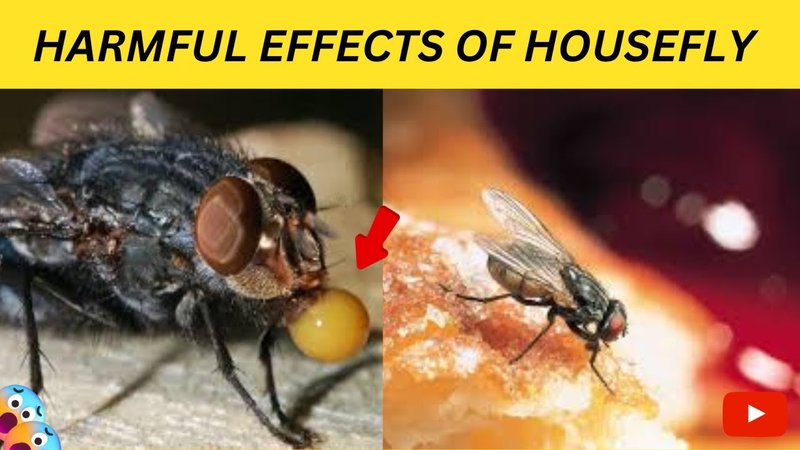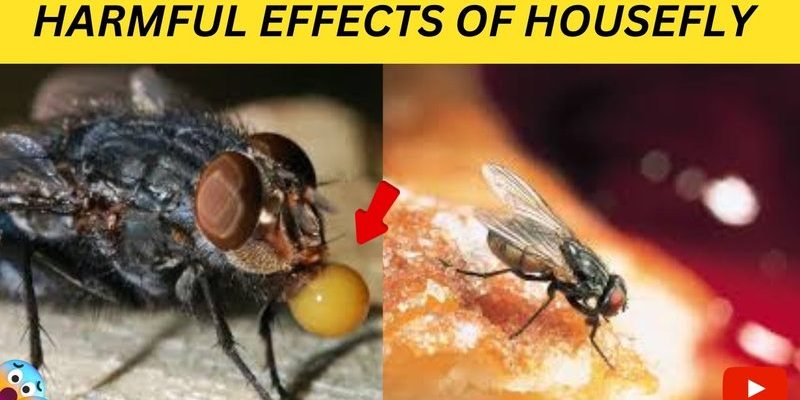
Houseflies are like the uninvited guests at a party—always around and hard to ignore. These tiny insects are commonly found in homes, especially in warmer weather. While they seem harmless, it’s important to understand that they can carry more than just annoyance; they can also carry bacteria and diseases to humans. In this article, we’ll dive into the various aspects of houseflies and explore whether they really pose a danger to our health.
What Are Houseflies?
Before we jump into the dangers, let’s get to know our buzzing friends a bit better. Houseflies, scientifically known as *Musca domestica*, are small, grayish insects with four dark stripes on their thorax. They typically grow to about 1⁄4 inch long. You might think they’re just a nuisance, but they play a role in our ecosystem. For instance, they help decompose organic matter, which is vital for nutrient cycling.
Houseflies are found almost everywhere humans are, from urban areas to farms. They thrive in warm, humid climates, making summers their peak season. The lifecycle of a housefly is quite fascinating, consisting of several stages: egg, larva, pupa, and adult. In perfect conditions, these little critters can go from egg to adult in less than a week! Just imagine how quickly they can multiply in your home if left unchecked.
How Do Houseflies Spread Diseases?
Here’s the thing: houseflies don’t just spread irritation—they can also spread diseases. They feed on decaying organic material, like garbage and animal waste, and during this process, they pick up bacteria and pathogens. When they land on your food or surfaces, they can leave behind those harmful germs.
Some common diseases associated with houseflies include:
- Salmonella: Often linked to food poisoning, this bacteria can cause severe gastrointestinal issues.
- E. coli: Known for causing serious infections, it can be transmitted through contaminated food.
- Cholera: In areas with poor sanitation, houseflies can carry cholera pathogens, which can lead to severe diarrhea and dehydration.
You might be wondering how much of a risk this really is. In general, the risk of getting sick from houseflies is relatively low, but it increases if flies have access to dirty areas and aren’t managed properly.
Are Houseflies Attracted to Certain Foods?
Absolutely! Just like you might be drawn to the aroma of freshly baked cookies, houseflies are attracted to a variety of foods. They seem to have a special fondness for:
- Fruits and Vegetables: Ripe or decaying produce can lure them in.
- Meats: They love the smell of raw or spoiled meat.
- Sweet Foods: Sugary drinks and desserts are irresistible to them.
Understanding what attracts houseflies can help you take preventative measures. For instance, keeping your kitchen clean and covering food can significantly reduce their presence.
Do Houseflies Bite?
Here’s a common misconception: houseflies don’t bite! They have sponging mouthparts that allow them to feed on liquids, like nectar or decaying matter. However, they can be quite irritating when they land on your skin, especially if you’re trying to enjoy a quiet moment.
That said, there are other fly species, like horseflies or deer flies, that do bite and can be a nuisance. But houseflies? They’re all about the food and not about biting humans. So, if you’re dealing with these pests, it’s mostly about keeping them off your food rather than worrying about bites.
How to Manage Housefly Infestations
If houseflies have taken over your space, don’t worry—there are ways to manage them effectively. Here are some steps you can take to reclaim your home:
- Maintain Cleanliness: Regularly clean your kitchen and dining areas. Wipe down counters and dispose of garbage promptly.
- Seal Entry Points: Close windows and doors, or install screens to keep flies out.
- Use Fly Traps: Sticky traps or electric fly zappers can help reduce their numbers.
- Natural Repellents: Essential oils like peppermint and eucalyptus can deter flies. Just mix a few drops with water in a spray bottle and spritz it around.
These measures can go a long way in keeping your space fly-free and comfortable.
In the grand scheme of things, houseflies aren’t the worst pests you can encounter. They can be a nuisance, but with proper hygiene and management, the risks they pose can be minimized. While they carry bacteria and can spread disease under certain conditions, being proactive about cleanliness and prevention can keep your home safe.
Ultimately, understanding the behavior of houseflies and how they interact with our environment is key. As annoying as they can be, they also serve a purpose in nature. So, the next time you swat one away, remember that while they may be irritating, they’re not your biggest threat—unless, of course, you leave that sandwich sitting out!

